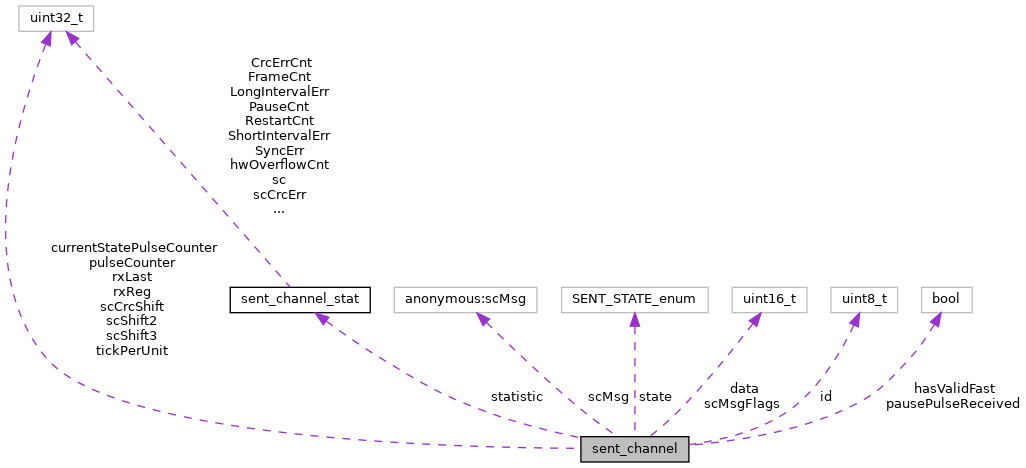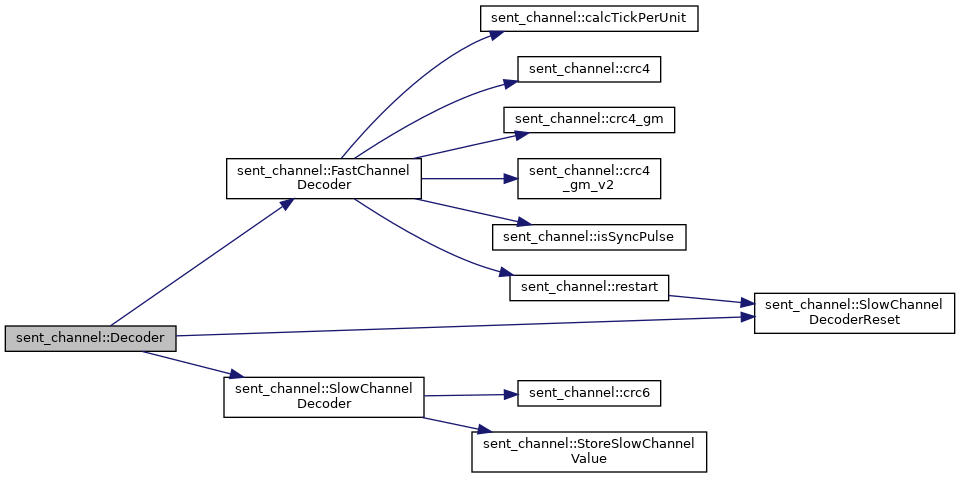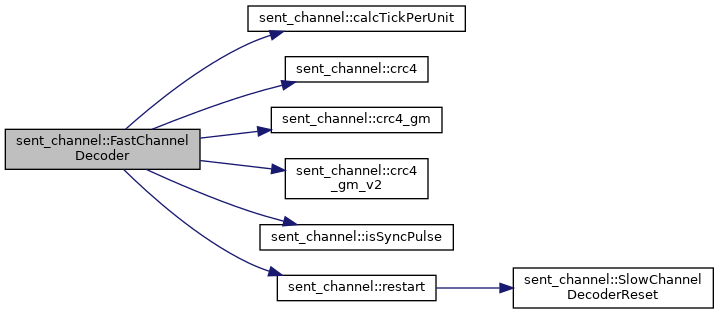#include <sent_logic.h>

Public Member Functions | |
| int | Decoder (uint32_t clocks, uint8_t flags=0) |
| int | GetMsg (uint32_t *rx) |
| int | GetSignals (uint8_t *pStat, uint16_t *pSig0, uint16_t *pSig1) |
| int | GetSlowChannelValue (uint8_t id) |
| float | getTickTime () |
| void | Info () |
Data Fields | |
| struct { | |
| uint16_t data | |
| uint8_t id | |
| } | scMsg [SENT_SLOW_CHANNELS_MAX] |
| sent_channel_stat | statistic |
Private Member Functions | |
| int | StoreSlowChannelValue (uint8_t id, uint16_t data) |
| int | FastChannelDecoder (uint32_t clocks) |
| int | SlowChannelDecoder () |
| void | SlowChannelDecoderReset () |
| uint8_t | crc4 (uint32_t data) |
| uint8_t | crc4_gm (uint32_t data) |
| uint8_t | crc4_gm_v2 (uint32_t data) |
| uint8_t | crc6 (uint32_t data) |
| void | calcTickPerUnit (uint32_t clocks) |
| bool | isSyncPulse (uint32_t clocks) |
| void | restart () |
Private Attributes | |
| SENT_STATE_enum | state = SENT_STATE_CALIB |
| uint32_t | tickPerUnit = 0 |
| uint32_t | pulseCounter = 0 |
| uint32_t | currentStatePulseCounter = 0 |
| bool | pausePulseReceived = false |
| uint32_t | rxReg |
| bool | hasValidFast = false |
| uint32_t | rxLast |
| uint16_t | scMsgFlags |
| uint32_t | scShift2 |
| uint32_t | scShift3 |
| uint32_t | scCrcShift |
Detailed Description
Definition at line 56 of file sent_logic.h.
Member Function Documentation
◆ calcTickPerUnit()
|
private |
Definition at line 88 of file sent.cpp.
Referenced by FastChannelDecoder().

◆ crc4()
|
private |
Definition at line 479 of file sent.cpp.
Referenced by FastChannelDecoder().

◆ crc4_gm()
|
private |
Definition at line 497 of file sent.cpp.
Referenced by FastChannelDecoder().

◆ crc4_gm_v2()
|
private |
Definition at line 513 of file sent.cpp.
Referenced by FastChannelDecoder().

◆ crc6()
|
private |
Definition at line 529 of file sent.cpp.
Referenced by SlowChannelDecoder().

◆ Decoder()
| int sent_channel::Decoder | ( | uint32_t | clocks, |
| uint8_t | flags = 0 |
||
| ) |
◆ FastChannelDecoder()
|
private |
◆ GetMsg()
| int sent_channel::GetMsg | ( | uint32_t * | rx | ) |
Definition at line 318 of file sent.cpp.
Referenced by GetSignals().

◆ GetSignals()
| int sent_channel::GetSignals | ( | uint8_t * | pStat, |
| uint16_t * | pSig0, | ||
| uint16_t * | pSig1 | ||
| ) |
◆ GetSlowChannelValue()
| int sent_channel::GetSlowChannelValue | ( | uint8_t | id | ) |
◆ getTickTime()
| float sent_channel::getTickTime | ( | ) |
◆ Info()
| void sent_channel::Info | ( | ) |
Definition at line 559 of file sent.cpp.

◆ isSyncPulse()
|
private |
Definition at line 98 of file sent.cpp.
Referenced by FastChannelDecoder().

◆ restart()
|
private |
Definition at line 64 of file sent.cpp.
Referenced by FastChannelDecoder().


◆ SlowChannelDecoder()
|
private |
Definition at line 403 of file sent.cpp.
Referenced by Decoder().


◆ SlowChannelDecoderReset()
|
private |
◆ StoreSlowChannelValue()
|
private |
Definition at line 362 of file sent.cpp.
Referenced by SlowChannelDecoder().

Field Documentation
◆ currentStatePulseCounter
|
private |
Definition at line 64 of file sent_logic.h.
Referenced by FastChannelDecoder(), and restart().
◆ data
| uint16_t sent_channel::data |
Definition at line 102 of file sent_logic.h.
Referenced by crc4(), crc4_gm(), crc4_gm_v2(), crc6(), Info(), SlowChannelDecoder(), and StoreSlowChannelValue().
◆ hasValidFast
|
private |
Definition at line 69 of file sent_logic.h.
Referenced by FastChannelDecoder(), and GetMsg().
◆ id
| uint8_t sent_channel::id |
Definition at line 103 of file sent_logic.h.
Referenced by SlowChannelDecoder(), and StoreSlowChannelValue().
◆ pausePulseReceived
|
private |
Definition at line 65 of file sent_logic.h.
Referenced by FastChannelDecoder(), Info(), and restart().
◆ pulseCounter
|
private |
Definition at line 62 of file sent_logic.h.
Referenced by FastChannelDecoder(), Info(), and restart().
◆ rxLast
|
private |
Definition at line 71 of file sent_logic.h.
Referenced by FastChannelDecoder(), GetMsg(), and SlowChannelDecoder().
◆ rxReg
|
private |
Definition at line 68 of file sent_logic.h.
Referenced by FastChannelDecoder().
◆ scCrcShift
|
private |
Definition at line 77 of file sent_logic.h.
Referenced by SlowChannelDecoder().
◆
| struct { ... } sent_channel::scMsg[SENT_SLOW_CHANNELS_MAX] |
Referenced by GetSlowChannelValue(), Info(), and StoreSlowChannelValue().
◆ scMsgFlags
|
private |
Definition at line 74 of file sent_logic.h.
Referenced by GetSlowChannelValue(), Info(), restart(), and StoreSlowChannelValue().
◆ scShift2
|
private |
Definition at line 75 of file sent_logic.h.
Referenced by SlowChannelDecoder(), and SlowChannelDecoderReset().
◆ scShift3
|
private |
Definition at line 76 of file sent_logic.h.
Referenced by SlowChannelDecoder(), and SlowChannelDecoderReset().
◆ state
|
private |
Definition at line 58 of file sent_logic.h.
Referenced by FastChannelDecoder(), and restart().
◆ statistic
| sent_channel_stat sent_channel::statistic |
Definition at line 108 of file sent_logic.h.
Referenced by Decoder(), FastChannelDecoder(), Info(), restart(), and SlowChannelDecoder().
◆ tickPerUnit
|
private |
Definition at line 61 of file sent_logic.h.
Referenced by calcTickPerUnit(), FastChannelDecoder(), getTickTime(), Info(), isSyncPulse(), and restart().
The documentation for this class was generated from the following files:
- hw_layer/drivers/sent/sent_logic.h
- hw_layer/drivers/sent/sent.cpp






